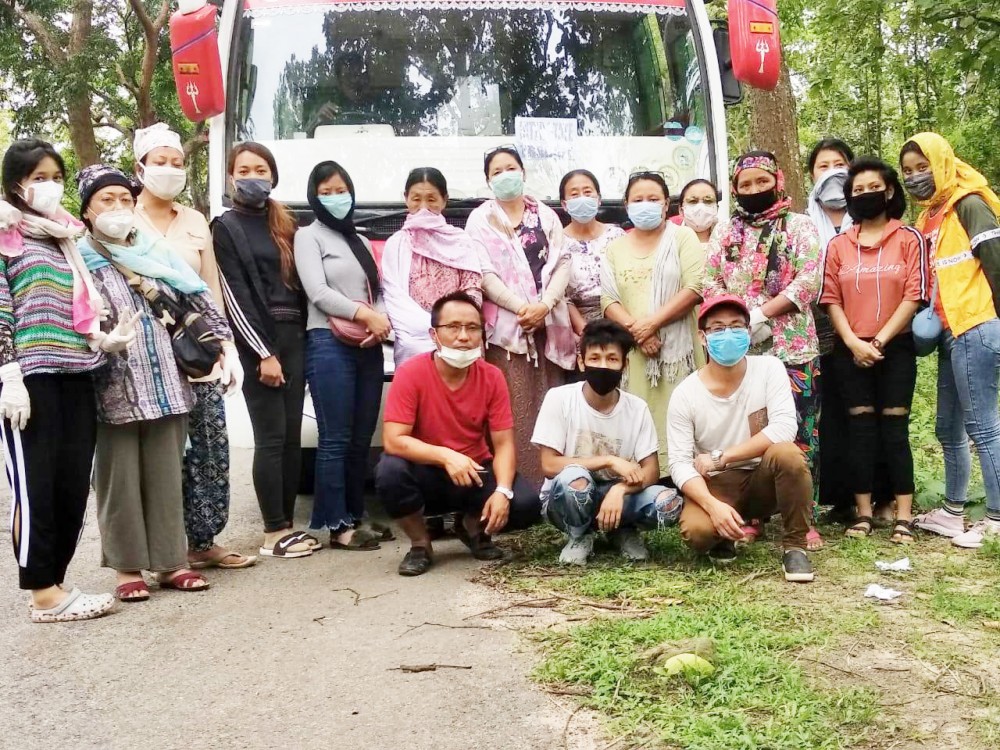The group after reaching Nagaland by bus on May 31.

Vishü Rita Krocha
Kohima | June 8
Reflecting the indomitable human spirit, courage and the sheer hope to come back home during the COVID-19 pandemic lockdown, a group of Naga women led by Sita Shüya, who showed extreme courage in bringing them safely to the confines of their hometowns, traversed a difficult journey all the way from Nepal to Nagaland.
When Sita Shüya and her 16-year old daughter, Vikesaü landed in Nepal on May 8, little did they expect that their return journey would involve wading across the international Mechi river at Indo-Nepal border, walking till their feet hurt and many other trying circumstances. “My daughter and I had travelled to Nepal to visit my ailing father before the lockdown right after she finished her matriculation exam,” says 48 year old Sita Shüya.
As they were planning on their return, they also received a call about some Nagas being caught by the Nepal Police while trying to get through the sealed international border in order to board a special train from NJP. On intervention by her father, 11 Naga women, most of them aged between 60 and 70 were eventually released. The group of women had reportedly gone to Nepal to attend a church programme.
“I didn’t know who they were but because they are Nagas, I felt it was my duty to help”, Shüya expresses in an exclusive interview with The Morung Express. That was when they became a team with a mission to come back home to Nagaland. However, even with the required permit from the Nepal government to cross the international border, none of them had visualized the difficult journey ahead of them.
“We cannot cross the border during the daytime, but have to get through at night since it was not open and thousands of Indians are stranded by the border”, she relates. Leading the group of Naga women including a young male theologian, she had warned them that it would be a long journey and anything can happen, and that, they shouldn’t panic. “If you trust me, I can take you, else I can’t,” she had told them.
On the evening of May 29 at around 6:00 pm, they started walking with their luggage in arm that seemed to be getting heavier every minute as their walk continued to stretch for hours. “We just walked and walked and by the time we crossed the Nepal border, it was almost midnight”, she divulges. However with just a few steps left to reach the customs office, they found themselves surrounded by security forces carrying lathis and shields only to be told they cannot enter India and were asked to go back where they came from, despite carrying the required permits, she reveals.
With their hopes dashed in that helpless situation, they returned back to Nepal on foot, crossing the river once more. However, the warm hospitality of her parents kept their spirits soaring back in Nepal as they were served with Naga food and a comfortable place to rest their heads for a while.
In the meantime, Shüya had been in touch with Nagaland House, Kolkata, who had arranged a bus at NJP to take them home along with 3 other stranded Nagas from Kolkata.
“The next day, we started walking down the river again with our luggage. We just looked to the path we were taking and kept marching towards India. There was so much risk”, she narrates. Thanks to her parents again, this time they set off with more coordination at the Indian border, where a vehicle would be waiting to carry them straight to where the bus was waiting.
“On our way back, the bus was filled with eatables—puri, subji, banana, water, it was so nice that they (Nagaland House Kolkata) cared for us. They did their best”, she states. The team finally touched home on May 31. Even with bruises on their arms from carrying their belongings and swollen feet from walking so much, they are visibly happy to be home.
Sita Shüya and her daughter were in the Meriema Quarantine Centre but moved to a paid quarantine on Sunday while the rest are also being quarantined in different centres. Making it to Nagaland, even though they are yet to be home with their families, is a battle won.
Towards this end, she expresses gratitude to her family as well as the staff and frontline workers at the centre, NGOs, Churches and Associations. “Our heartfelt thanks goes to our Chief Minister for providing us all the facilities right from the border till here.
Without him, I don’t think we could have made it. Even if we had money, it wouldn’t have been possible for us to reach home”, she puts across on behalf of the group while acknowledging all those who were involved in their journey.
Pointing out that “our people should be very grateful to the government,” she asserts that, “instead of fighting each other, we should join hands and fight this pandemic.”
“I am so thankful to our government and all those people working behind the scene, for our welfare”, she articulates.






